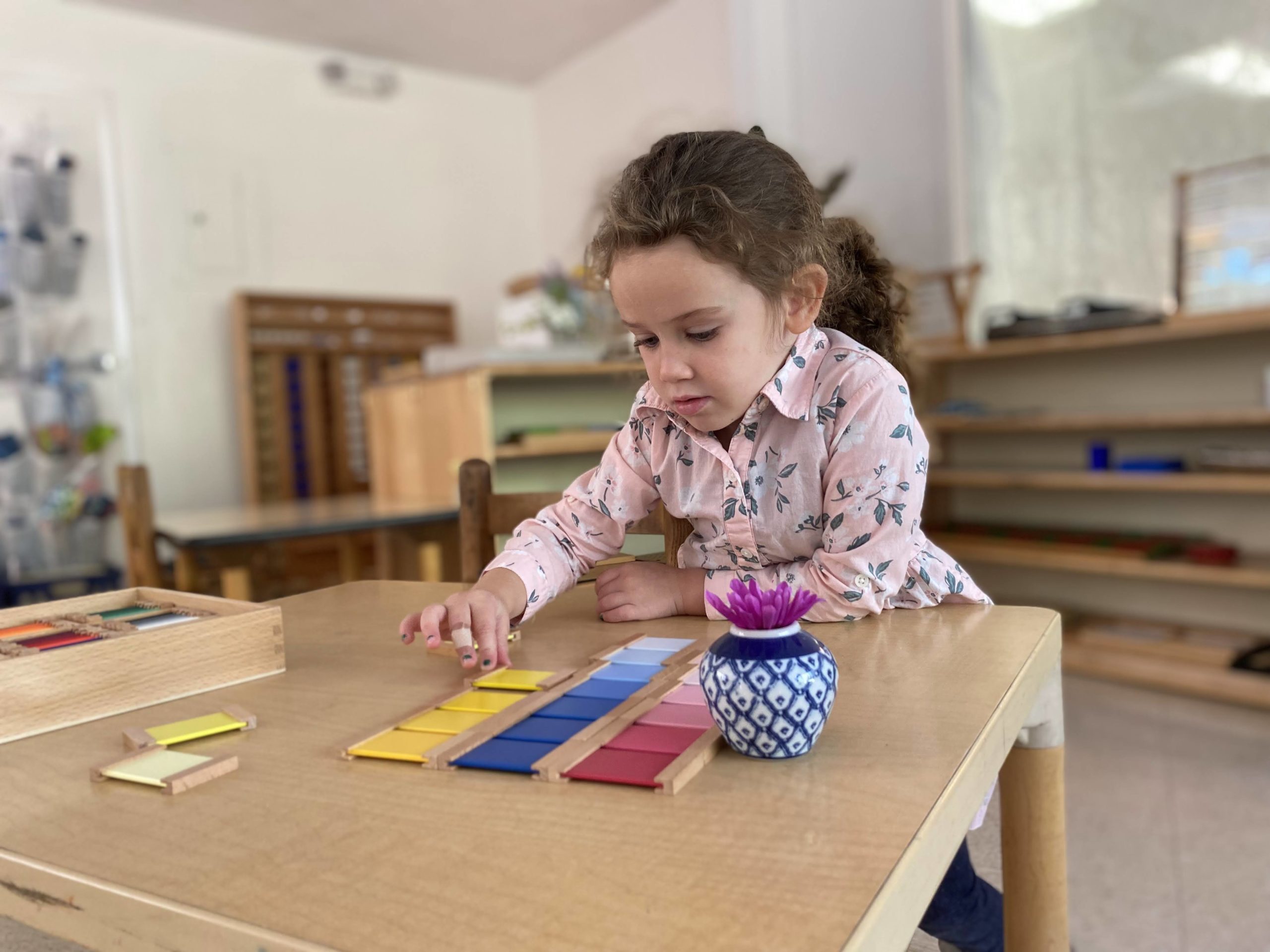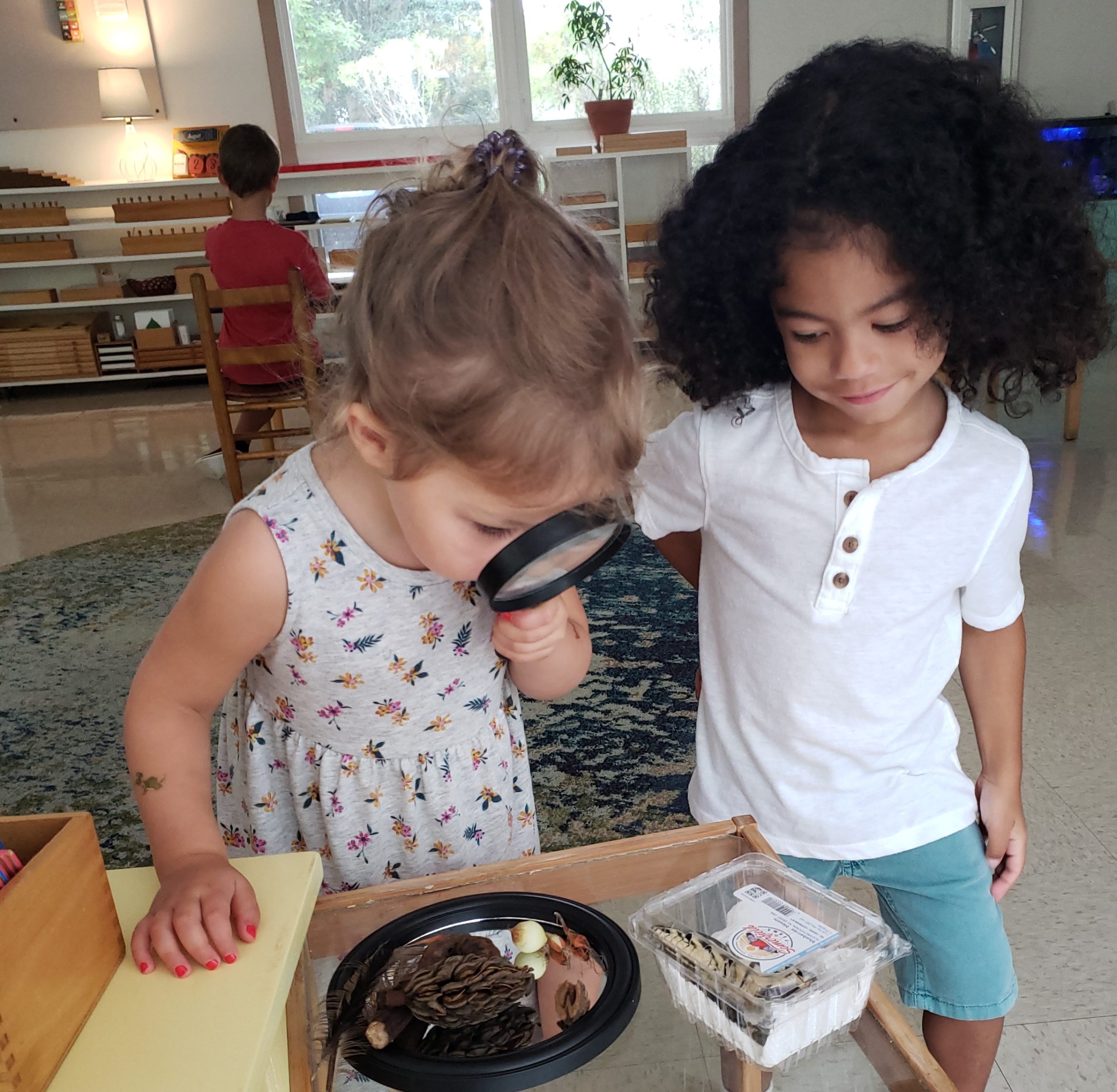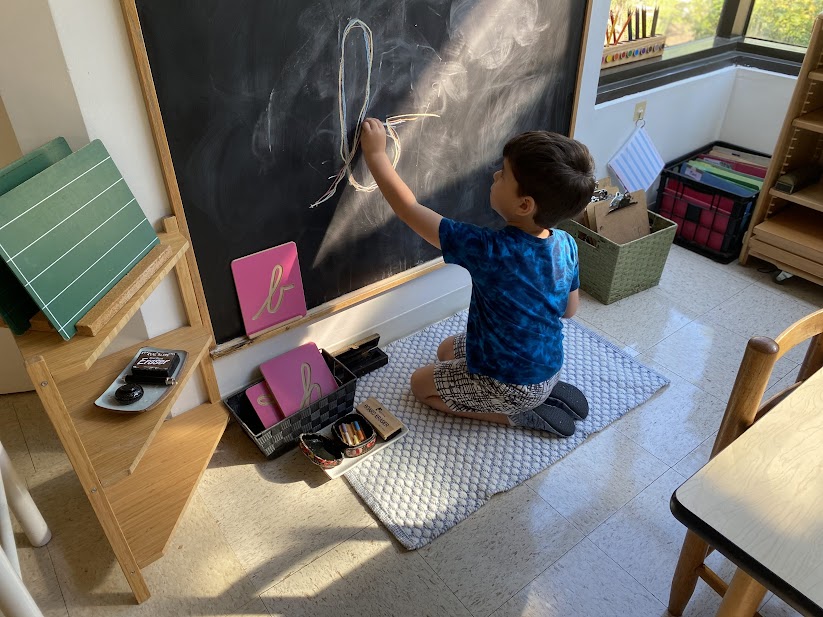


The Primary Community
At CMS, two Primary Communities serve the needs of children between the age of 3 through 6 ½ years. Children in this age range possess a strong internal drive to explore the world around them and have a tremendous capacity for learning. They have an absorbent mind, which allows them to effortlessly learn about and adapt to their environment. Like the child in the YCC classroom, children in Primary continue to urge, “Show me how to do it myself!”
Through the guidance of one trained teacher and one assistant, children in Primary classrooms make independent, age-appropriate work choices in the areas of care of self, care of their classroom environment, language, mathematics, art, music, sensory development, geography and cultural studies, and grace and courtesy.
Both of our Primary environments contain complete sets of Montessori materials and each has access to an outdoor classroom. Children spend their morning work cycle working with materials which they have been presented, receiving an individual lesson from the teacher, visiting with a friend, eating snack, helping a younger child, observing an older child, working outside, and much more. Each child’s morning will be driven by her own interests and abilities and guided by the experienced teacher. We find that this freedom of choice in work builds independence, self-confidence, concentration, and mastery of material at a different rate than traditional models of education. In addition, this freedom of choice only enhances the child’s natural love of learning.
Montessori Primary classrooms are communities of mixed ages of children between 3 years and 6.5 years. Ages are balanced within the classroom community and children return to the same classroom each year. This mix of ages and consistency of classroom from year to year enable children to lead, to follow, to develop empathy by helping those less capable, and to aspire to the “big work” of their older peers. The children freely interact with each other throughout the school day. We find that these freedoms lead to the early development of self-confidence and self-worth and to a thoughtful appreciation of the contributions of individuals within a community. We observe that children experience comfort with mistakes and challenges and frequently seek help from peers without disappointment or shame.
Montessori materials are beautiful, ordered, and exact – they are attractive to children and demand to be explored again and again. Repetition leads to mastery and mastery leads to knowledge and self-confidence. The main areas of the primary classroom are:
Practical life: The direct purpose of this work is to help the children to care for themselves and for their classroom environment. You will observe children preparing food for snack time, arranging flowers to offer beauty, sweeping a floor, wiping a spill, straightening a shelf, dusting materials, washing a table, and so much more. Indirectly, these practical works develop concentration, care of movement, a strong sense of self-worth, and responsibility to the classroom community. Montessori work is always real and purposeful.
Sensorial: These materials help the child to refine and classify the many sensory impressions experienced in daily life. Through the child’s own manipulation of the Montessori materials she gains understanding of the world and refines her mental classification of the world.
Language: Language surrounds the child in the Montessori environment. Conversation, poetry, songs, and stories are a regular part of every day. Vocabulary enrichment provides an oral foundation for the children’s ever-expanding understanding and use of language and lays the foundation for later writing and reading. Listening and comprehension are developed as children explore the sounds of our language. Phonetic sounds are presented and lead to writing and later to reading. Older children explore grammar through games and activity.
Mathematics: Math is presented through very concrete and manipulative materials. Neuroscience proved in the last few decades what Montessori observed more than a century ago – cognition is driven by movement. Children must explore with their senses in order to learn about their world. Montessori is a hands-on approach to learning. We find that manipulative math materials at the Primary level lead to a much deeper abstraction of mathematical concepts in our Elementary program.
Music, movement, geography, botany, zoology, art, and cultural studies are among the many other topics presented to the children in the Primary classroom.
Each of our Primary Communities meet 5 days per week. Children under the age of 5 may stay for a half-day or a full-day. Children who stay for the full-day will eat lunch, brought from home, in the classroom. After lunch, children under age 5 transition to low cots in a napping room. Children older than 5 years continue to work in the classroom for the afternoon.
From birth through age 6 is a time of immense growth for the child – physically, emotionally, socially, and intellectually. The sponge-like mind of the child will quite literally absorb it all – we offer specifically prepared environments, Montessori materials, and well-trained teachers to guide children on their educational journey.
Primary At A Glance
Location: Main Campus
Enrollment/Class: 22-28
Ages served: 3 – 6.5 years
Staff/Class: 1 AMI-trained faculty and 1 assistant
Daily Schedule:
8:15-8:30 AM – Arrival window
8:15-11:15 AM – Morning Work Period
11:30-12:00 PM – Recess
11:45-Noon – Half-day dismissal
Noon-12:45 PM – Lunch
1:00-3:00 PM – Nap (age 5 years and younger) or Afternoon Work Period (ages 5 and 6 years)
3:15-3:30 PM – Dismissal window
Magnolia Classroom Teacher – Paige Edwards
Magnolia Classroom Assistant – Kristen Keyes
Maple Classroom Teacher – Shandra Dohoney
Maple Classroom Assistant – Madi Brown
Primary Support – Mi-Mi Canterbury

